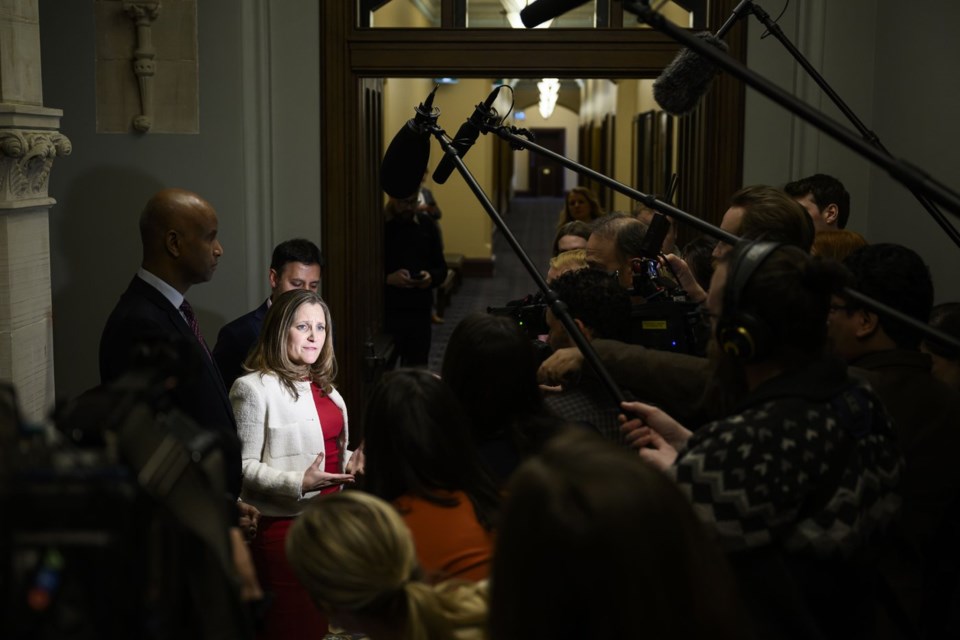OTTAWA — Liberal leadership candidate Chrystia Freeland has pitched a plan to lower food prices, tackling a key part of the cost-of-living issue that plagued her for much of her time as minister of finance.
Her affordability plan includes a promise to cap profit margins for grocers on essential items, including eggs, milk, vegetables and baby formula.
She's also promising to outlaw "shrinkflation" — the practice of making containers slightly smaller so consumers barely notice they're paying the same for less — and to overhaul the Competition Bureau to "end deceptive behaviour and impose zero-tolerance for bad actors."
"My government will use tax dollars responsibly. I will pay for these measures by reducing the cost of running government — without cutting the benefits and services Canadians count on," Freeland said in an email outlining her plan.
"This means cutting red tape, streamlining how government does business, and leveraging new digital and AI tools to deliver benefits and services to Canadians, faster and better."
Freeland is one of five people running to replace Prime Minister Justin Trudeau, who said last month he will resign as soon as a new leader is elected.
Former central banker Mark Carney, MP Karina Gould and former MPs Frank Baylis and Ruby Dhalla are also in the running for the Liberals' top job. The vote is scheduled for March 9.
Monica LaBarge, an assistant professor at Queen's University who studies food access and consumer well-being, said while Freeland's plan sounds good politically, it's not clear whether it can lower costs.
"I am the first one to say that I think food affordability should be a number 1 issue for whoever's running for prime minister or head of the Liberal party, because, as we know, there's ... an increasing number of Canadian households that are becoming food insecure," LaBarge said.
"But I failed to see how what Mrs. Freeland is proposing would actually be possible."
LaBarge said the plan goes beyond the scope of what a government can do to the market, adding grocers are in a complex business selling products with shifting prices that can be difficult to track.
And while it may be wise to try to draw foreign grocers here, LaBarge said Canada's small population size and established businesses here could make that a difficult pitch.
"That's not a short-term solution. (Foreign grocers) aren't going to come in tomorrow and open up a bazillion stores and be able to offer people groceries in March," she said.
There are other ways to lower costs for Canadians, LaBarge said, including expanding school food programs and targeted measures for low-income people and families.
"That's a reasonable and replicable thing that other countries have done — that we could do at a government level — that would be easier than what she has proposed."
Rising food prices have been a major cause of anxiety and hardship for Canadians over the last four years. Annual tracking by four universities published in Canada's Food Price Report shows costs increased almost five per cent in 2021, more than 10 per cent on average in 2022, almost six per cent in 2023 and nearly three per cent in 2024.
Statistics Canada has reported a significant increase in the number of Canadians living in what it calls "food insecure" households — from about 6.1 million people in 2019 to almost 8.7 million people in 2023.
The Liberals have pushed national grocers to sign a code of conduct to help lower prices but have resisted the NDP's calls for price caps.
Freeland said more than once in 2023 that Canada's grocery industry needs more competition and while the Liberal government has sought to accomplish that, no new retailers have appeared.
Freeland's email said she will improve competition by banning grocers from also owning wholesalers, processors and distributors.
She also promised low-cost financing to attract new independent grocers and to consider allowing foreign grocers into the market — with the exception of American grocery chains.
That's a nod to Canada's ongoing tariff battle with the United States and President Donald Trump's repeated threats to Canada's sovereignty.
Freeland is also proposing to build 100,000 more $10-a-day child care spaces by "requiring new or renovated federal office buildings" to provide them. She said a government led by her would offer "new or renovated space in federal buildings to non-profit providers free of charge, and (lower) existing rents for non-profit providers to zero dollars within sixty days.”
"I will cut taxes for the middle class, including for Canadians buying that first home. And I will cut the costs of credit card debt, groceries, and child care for all Canadians," Freeland said.
The NDP said in a media statement that Freeland's current position on affordability departs from her previous actions.
"Chrystia Freeland had her chance to stand up to grocers and put a price cap on groceries — but she chose not to," the party said in a media statement, referring to Freeland voting against an NDP motion to put a price cap on groceries last June.
"Despite promising that her government 'would do everything in [their] power to make sure prices stabilize,' Freeland chose not to implement a price cap when she was the minister of finance.
"Freeland is doing what Liberals do best: when they’re desperate for your vote, they promise to lower prices and get tough on billionaires. But when they get in government, they cave to big business and corporate greed."
This report by The Canadian Press was first published Feb. 11, 2025.
Alessia Passafiume, The Canadian Press




